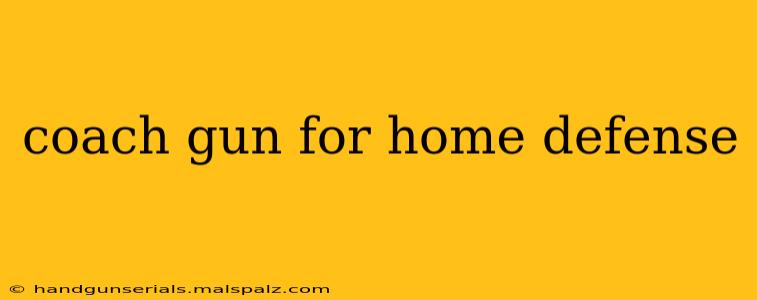The coach gun, a compact double-barreled shotgun, has gained a reputation as a formidable home-defense weapon. Its size, ease of use, and stopping power make it an attractive option for some, but is it the right choice for your home defense strategy? This in-depth article explores the pros and cons of using a coach gun for home defense, delving into practical considerations, legal implications, and safer alternatives.
The Allure of the Coach Gun: Compact Power
The coach gun's appeal stems from its inherent advantages:
- Compact Size and Maneuverability: Its small stature makes it ideal for navigating tight spaces within a home, a crucial factor in close-quarters self-defense scenarios. This advantage is particularly noticeable compared to longer firearms.
- Stopping Power: Firing two shots of 12-gauge buckshot or 00 buckshot delivers significant stopping power, potentially incapacitating a threat quickly.
- Simplicity and Reliability: The basic mechanics of a double-barreled shotgun are inherently simple, contributing to greater reliability in stressful situations. There are fewer moving parts to malfunction.
- Intimidation Factor: The very sight of a shotgun can be a deterrent, potentially de-escalating a situation before it escalates to violence.
The Drawbacks: Considerations for Home Defense
Despite its appeal, the coach gun presents several significant drawbacks for home defense:
- Limited Ammunition Capacity: Only two shots are available before reloading, a critical limitation in a scenario involving multiple attackers. This necessitates quick and precise shot placement.
- Recoil: The substantial recoil can be challenging for less experienced shooters, potentially impacting accuracy and follow-up shots.
- Spread Pattern: At close range, the spread pattern of shotgun pellets is effective, but accuracy decreases significantly at longer ranges, making precise shots more difficult.
- Overpenetration: The risk of overpenetration with buckshot is considerably higher than with other ammunition types, posing a danger to occupants in adjacent rooms or even beyond the home. This is a serious safety concern.
Legal Considerations: Navigating the Laws
Before considering any firearm for home defense, it's crucial to understand the relevant laws and regulations in your jurisdiction. These laws vary significantly by state and locality, covering aspects such as:
- Licensing and Registration: Requirements for firearm ownership, licensing, and registration differ widely.
- Use of Force Laws: Understanding the legal framework surrounding self-defense is paramount. These laws dictate the circumstances under which the use of lethal force is justified.
- Storage Requirements: Safe and secure storage of firearms is often legally mandated to prevent accidents or unauthorized access.
Safer Alternatives for Home Defense
While the coach gun might appeal to some, several safer and potentially more effective alternatives exist for home defense:
- Pump-Action or Semi-Automatic Shotguns: Offer higher ammunition capacity, reducing the risk of running out of ammunition during an attack.
- Handguns: Easier to handle and manipulate for some individuals, offering greater accuracy at longer ranges.
- Self-Defense Training: Regardless of the chosen firearm, comprehensive self-defense training is crucial. This training should cover situational awareness, de-escalation techniques, and proper firearm handling.
Conclusion: Weighing the Risks and Rewards
The decision of whether or not a coach gun is suitable for home defense is highly personal. While its compact size and stopping power are appealing, the limited ammunition capacity, substantial recoil, and risk of overpenetration must be carefully considered. Thorough research, understanding local laws, and engaging in professional firearms training are essential steps before making this decision. Ultimately, the most effective home defense strategy involves a combination of situational awareness, proactive measures, and the responsible use of a firearm—if one is chosen at all. Remember to consult with a firearms expert and legal professional to ensure your choices align with your needs and the law.

